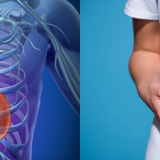Topping the nationwide rise in metabolic disorders, diabetes mellitus affects people of all ages, races and backgrounds. Adult onset diabetes mellitus, otherwise known as Type II diabetes, affects approximately 24 million Americans. Experts believe that by the close of 2010, an estimated 10 percent of the American population will have Type II diabetes. Unfortunately, diabetes is the leading cause of chronic kidney disease and kidney failure in the United States. By prioritizing several important practices, those with diabetes can protect their precious kidneys from further harm.
About Diabetes
Diabetes mellitus is a group of metabolic diseases characterized by high blood sugar (glucose) levels.
- Soon after eating, the sugars in food are digested and broken down into glucose.
- Glucose is then used by cells as fuel.
- In response to glucose in the blood, the pancreas secretes insulin to facilitate glucose movement into cells.
- A healthy pancreas produces the right amount of insulin to move glucose from blood into the cells.
- In those with diabetes, the pancreas either produces little or no insulin, or the cells do not respond appropriately to the insulin that is produced.
As a consequence, diabetes interferes with the way a body accesses food for energy and it wrecks havoc on multiple systems by leaving too much glucose in the blood.
Types of Diabetes
There are two main kinds of diabetes: Type 1 and Type II. In Type 1, the body’s immune system destroys insulin-producing cells in the pancreas. Type 1 is less common and is usually diagnosed in childhood. In Type II, a pancreas either does not produce enough insulin or the body cannot use insulin adequately (insulin resistance). Type II is by far the most common kind of diabetes, and it often develops in adolescence or adulthood. Before people develop Type II diabetes, they usually have pre-diabetes – where blood glucose levels are higher than normal but not yet high enough to be diagnosed as diabetes. An estimated 57 million people in the United States have pre-diabetes.
How Diabetes Affects the Kidneys
Each year in the United States, more than 100,000 people are diagnosed with kidney failure, a serious condition in which the kidneys fail to rid the body of wastes. Diabetes is the most common cause of kidney failure (the final stage of chronic kidney disease), accounting for nearly 44 percent of new cases. However, kidney damage typically takes decades to occur as a result of diabetes.
While there appear to be a variety of reasons explaining why those with diabetes are prone to kidney damage, knowing how the kidneys function to cleanse the blood broadens this understanding. The following describes the kidneys’ role in cleaning the blood:
- When we digest protein, waste products are created and enter the circulatory system.
- In the kidneys, millions of small blood vessels with tiny holes act as filters.
- As blood flows through the kidney’s blood vessels, waste products squeeze through the holes.
- These waste products become part of the urine.
- Useful substances, such as protein and red blood cells, are too big to pass through the holes in the kidneys’ filters and remain in the blood.
Because excessive quantities of glucose in the blood makes more filtering work for the kidneys, diabetes stresses and eventually damages the kidneys’ filtration system. After many years of contending with high blood glucose levels, the kidneys’ filters begin to leak – allowing blood and protein into the urine. Over time, diabetes can cause the kidneys to sustain more and more damage. Leaky filters cause waste products to build up in the blood, which can end up causing the kidneys to fail. When in kidney failure, a transplant or dialysis is the only way a person can survive.
Protection from Diabetic Kidney Disease
For those who are pre-diabetic, have diabetes or already have diabetic kidney disease, preventing kidney damage is essential. Experts suggest the following three approaches for protecting the kidneys from the perils of diabetes:
- Protein Restriction – Excessive consumption of protein may be harmful to those with diabetes. Experts advise those with kidney disease or diabetes to avoid high-protein diets, but suggest they consume the recommended dietary allowance for protein. Those who have reduced kidney function should work with a dietician to ensure they limit their protein sufficiently.
- Blood Sugar Control – Also known as glycemic control, intensive management of blood glucose helps those with diabetes protect their kidneys. By keeping blood glucose levels as close to normal as possible, glycemic control includes testing blood glucose frequently, administering insulin based on food intake and physical activity, following a diet and activity plan, taking other blood glucose stabilizing medications and consulting with a health care team regularly. In a trial supported by the National Institute of Diabetes and Digestive and Kidney Diseases, researchers found a 50 percent decrease in both development and progression of early diabetic kidney disease in those who followed an intensive regimen for controlling blood glucose levels.
- Blood Pressure Management – The American Diabetes Association and the National Heart, Lung and Blood Institute recommend that people with diabetes keep their blood pressure below 130/80. High blood pressure is a major factor in the development of kidney problems in people with diabetes. Besides potentially causing kidney disease, high blood pressure also accelerates its progression. Whether managed with diet and exercise or with blood pressure lowering medications, early detection and treatment of high blood pressure are essential for people with diabetes.
Because they are so closely connected, there is no guaranteed route for those with diabetes to circumvent kidney disease. However, through careful monitoring and handling of protein intake, blood glucose levels and blood pressure, those with diabetes can ease some of the additional burdens placed on their hardworking kidneys.




